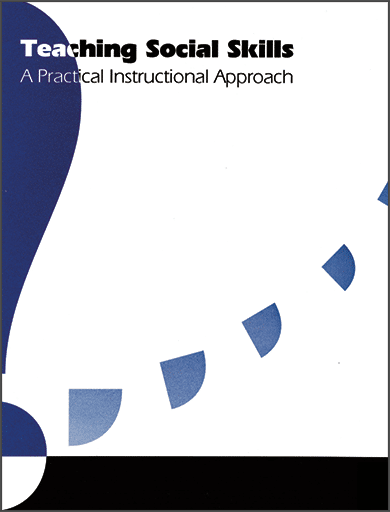
Teaching Social Skills

Available as eBook Only
Authors: Robert Rutherford, Jane Chipman, Sam DiGangi, & Kathryn Anderson
ISBN 1-931311-06-4
$9.99 / #e-tss001-A
Add to CartOr order individual skill packets (see Details).
A Practical Instructional Approach-Skill Packets
Learn a sound, easy-to-use instructional approach for helping students develop critical social skills. This data-based approach is designed to help students with behavioral difficulties—withdrawn behaviors, immature behaviors, aggressive behaviors—learn appropriate behaviors; it is intended to be implemented in either general classroom or specialized contexts. The approach has been successfully implemented in schools nationwide.
The manual explains the instructional strategies and offers practical advice on applying the approach to children with difficult behaviors. The social skills selected for inclusion in the program–for example, accepting consequences, listening, following directions, coping with conflict, accepting responsibility for one’s behavior, making friends–were identified by over 1,000 teachers as being the most needed.
The overview contains information on the approach. The skill packets provide lessons and student self-monitoring materials for different social skill areas:
- Basic Classroom Social Skills—saying please and thank you, asking questions, listening, following directions, and waiting one’s turn. [65 pages]
- Positive Peer Interactions—making friends, cooperating with others, dealing with losing, understanding others’ feelings, and compromising with peers. [70 pages]
- Coping with Conflict-successfully dealing with conflict, accepting responsibility for behavior, coping with aggression from others, accepting not getting one’s own way, and accepting the answer “no”. [70 pages]
- Replacement Behaviors–dealing with fear appropriately, dealing with anger appropriately, accepting consequences of behavior, responding to failure, and seeking attention appropriately. [66 pages]
For each social skill, lessons are tailored for students with difficult behaviors, including:
- Withdrawn behaviors.
- Immature behaviors.
- Aggressive behaviors.
Each lesson comes complete with:
- An environmental assessment.
- Detailed intervention plan for students who can’t perform the social skill.
- Detailed intervention plan for students who won’t perform the social skill.
- Record card for assessment.
Table of Contents
- Introduction
The Teaching Social Skills Program 1
- Program Structure 1
- Teaching Social Skills 3
- Conclusion 9
- References 9
- The Teaching Social Skills Model 10
Saying Please and Thank You
- Student: Withdrawn 11
- Student: Immature 13
- Student: Aggressive 15
Dealing with Fear Appropriately
- Student: Withdrawn 17
- Student: Immature 19
- Student: Aggressive 21
Dealing with Anger Appropriately
- Student: Withdrawn 23
- Student: Immature 25
- Student: Aggressive 27
Rewarding Oneself
- Student: Withdrawn 29
- Student: Immature 31
- Student: Aggressive 33
Asking Questions
- Student: Withdrawn 35
- Student: Immature 37
- Student: Aggressive 39
Accepting Consequences of Behavior
- Student: Withdrawn 41
- Student: Immature 43
- Student: Aggressive 45
Successfully Coping with Conflict
- Student: Withdrawn 47
- Student: Immature 49
- Student: Aggressive 51
Accepting Responsibility for Behavior
- Student: Withdrawn 53
- Student: Immature 56
- Student: Aggressive 59
Listening
- Student: Withdrawn 61
- Student: Immature 63
- Student: Aggressive 65
Successfully Dealing With Losing
- Student: Withdrawn 67
- Student: Immature 69
- Student: Aggressive 71
Responding to Failure
- Student: Withdrawn 73
- Student: Immature 75
- Student: Aggressive 77
Successfully Dealing with Mistakes
- Student: Withdrawn 81
- Student: Immature 83
- Student: Aggressive 86
Building a Positive Self Attitude
- Student: Withdrawn 89
- Student: Immature 91
- Student: Aggressive 93
Following Directions
- Student: Withdrawn 95
- Student: Immature 97
- Student: Aggressive 99
Making Friends
- Student: Withdrawn 103
- Student: Immature 105
- Student: Aggressive 108
Understanding Others’ Feelings
- Student: Withdrawn 111
- Student: Immature 114
- Student: Aggressive 117
Compromising with Peers
- Student: Withdrawn 121
- Student: Immature 124
- Student: Aggressive 127
Coping with Aggression From Others
- Student: Withdrawn 131
- Student: Immature 133
- Student: Aggressive 136
Cooperating with Peers
- Student: Withdrawn 139
- Student: Immature 141
- Student: Aggressive 144
Accepting Not Getting One’s Own Way
- Student: Withdrawn 147
- Student: Immature 150
- Student: Aggressive 152
Seeking Attention Appropriately
- Student: Withdrawn 155
- Student: Immature 158
- Student: Aggressive 161
Waiting One’s Turn
- Student: Withdrawn 165
- Student: Immature 167
- Student: Aggressive 169
Accepting the Answer “No”
- Student: Withdrawn 173
- Student: Immature 176
- Student: Aggressive 178
Appendix: Record Card Masters
Read excerpts of this publication in PDF:
